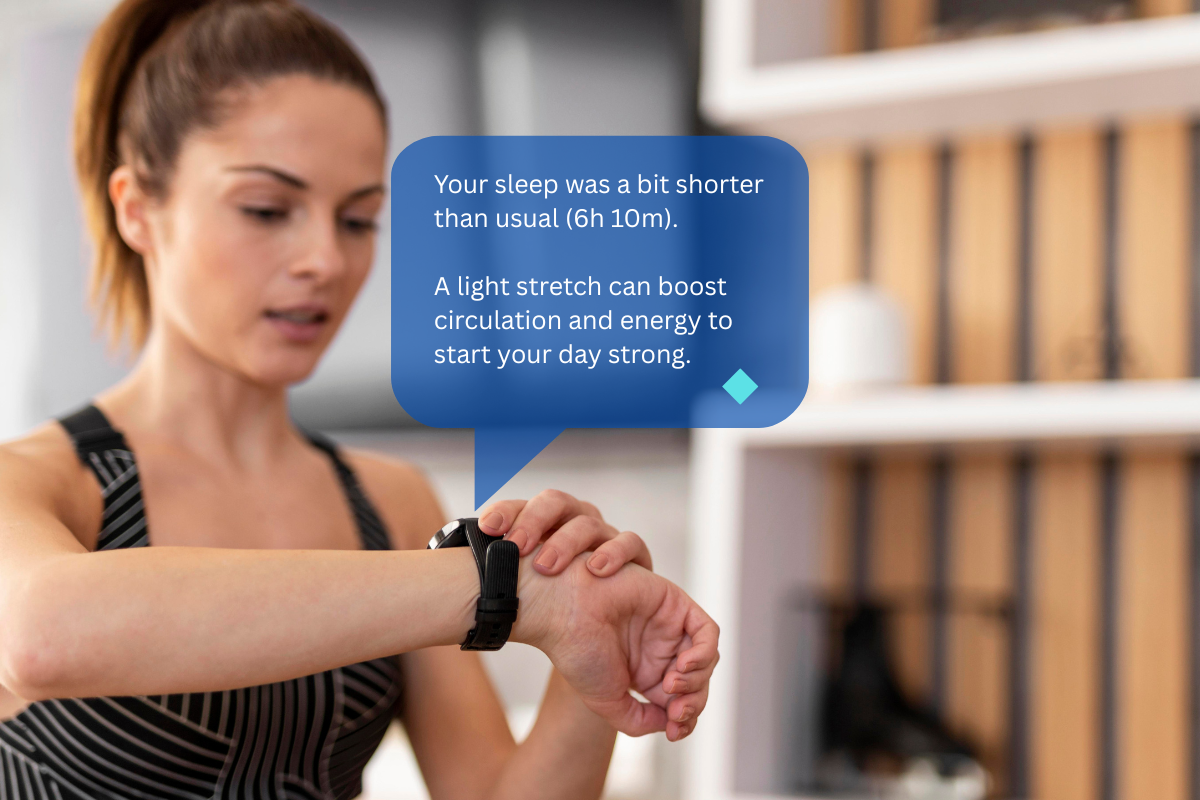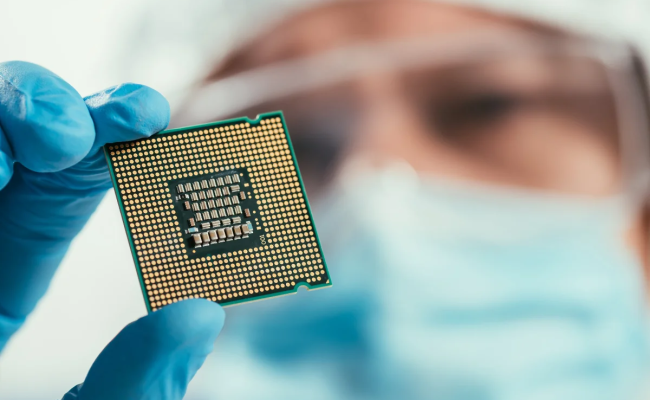
Not that long ago in human history, the idea of counting steps was mainly used for very rough estimates of distance or perhaps old-timey duels with pistols at sunset. Today, counting steps for health is common, and everyone understands what it means when someone says that they “have to get their steps in.”
The rise of edge AI, utilizing the latest energy-efficient semiconductor solutions, offers much more than just counting steps. The reason modern humans don’t say that the airport is 24,567 steps from their home is that steps are a personal measurement that differs from person to person.
Ten steps are not the same actual distance for everyone. Fitness trackers have accounted for this personalization, and by using AI, they are positioned to offer even more useful recommendations tailored to individuals. One of the most exciting prospects is the AI-powered personal health coach.
What Is an AI Personal Health Coach?
The word “coach” implies personal attention — and that’s exactly what an AI health coach provides. Instead of relying solely on averages calculated across a broad data set, it determines what might work best for each person and offers real-time, personalized wellness insights. Using edge computing allows these insights to be delivered quickly, without delays caused by constantly accessing the cloud for calculations.
The Explosion of Health Data
By now, it is well known that for artificial intelligence to succeed, it needs vast amounts of data. The challenge is selecting the right data—information that truly helps achieve the goals of AI integration. The health devices that can collect this data are many and diverse, ranging from common wearable devices and smartphone apps to more specialized tools such as smart insoles and glucose monitors. There are plenty of data collection opportunities, where AI supported by advanced semiconductor technology quickly processes this data into meaningful insights.

Benefits of AI Health Coaches
Real-Time Monitoring & Feedback
Besides just tracking strides, new fitness technology can gather data on a wide range of health metrics. And by keeping this information stored locally on the device — at the “edge” — it becomes much more capable of reacting quickly and providing important recommendations exactly when they are needed.
Real-time feedback also boosts safety. For example, edge-powered wearables can identify irregularities like abnormal heart rhythms or sudden movement imbalances and respond instantly with alerts or emergency prompts. This level of responsiveness turns fitness devices into smart companions that not only track performance but also actively help prevent injuries and promote overall health.
Personalized Recommendations
These recommendations are therefore highly personalized and tailored to the device user. The gradual decline in favor on standard metrics like body mass index (BMI) highlights the need for health advice that is specific to each individual.
Personalization also boosts motivation and adherence. When users receive recommendations that feel directly relevant to their goals, whether that’s improving endurance, managing weight, or enhancing overall well-being, they are more likely to stay engaged and follow through. In this way, fitness devices become more than just simple tracking tools; they evolve into adaptive coaches that adjust to the user’s progress and changing health needs.
Behavioral Nudges
Often enough, sustained healthy behavior only needs a gentle nudge. Whether it’s a friendly reminder to move around a bit after a long period of inactivity or a suggestion to aim for a better night’s sleep, small encouragements to live healthier lives are a key part of an AI health coach’s role.
AI-driven health coaches enhance this idea by making nudges smarter and more aware of context. Instead of sending generic alerts, they examine individual patterns and offer guidance at the most critical moments: suggesting relaxation techniques when stress increases, recommending a quick walk to break up sedentary periods, or encouraging earlier bedtimes based on detected sleep deficits.
These micro-interventions leverage behavioral science to reinforce positive routines without overwhelming users. Over time, such personalized nudges can help users adopt healthier habits, transforming small adjustments into lasting lifestyle changes.
Predictive Analytics
The data gathered by an AI coach can be used for more than just behavioral suggestions. It can also help prevent disasters. The AI doesn’t replace a doctor, but it alerts the user when it’s time to see one.
In this way, predictive analytics acts as a safeguard — not diagnosing conditions directly, but helping users take action earlier, when interventions are most effective. By combining continuous monitoring with intelligent foresight, AI health coaches turn wearables from simple trackers into proactive partners in preventive care, empowering individuals to stay ahead of potential problems.
Current AI Health Coaches on the Market
There are already several AI-powered health monitoring devices on the market, with many more upcoming.
Google’s newly launched Pixel Watch 4 uses the Fitbit AI health coach1 to provide adaptive workout recommendations, avoiding a one-size-fits-all approach to exercise in favor of a highly personalized regimen tailored to the individual’s needs and goals. It also uses Google’s Gemini AI assistant to offer more personalized advice based on your health data than the generic responses most fitness chatbots provide.
Garmin also offers an AI coach2 that monitors training performance to automatically adjust training plans, supported by expert sports physiologists. Didn’t get enough sleep? The Garmin Coach can detect that and modify your training plan to prevent overexertion and help you stay on track to achieve your personal fitness goals.
Whoop has launched its next generation of smart wearables and the Whoop Coach to monitor all activity, promoting the idea that simply showing interest in tracking daily movement can actually encourage healthier habits. WHOOP provides highly personalized, conversational responses to your questions about health, fitness, and wellness within seconds, powered by OpenAI’s latest technology.
This is just a small sample of what is currently out there, with many more devices and applications in development.
The Future of Personal Health Is Integrated With AI
AI’s ability to interpret large and ever-changing data sets makes it ideal for monitoring and responding to continuously collected personal health information. The gap between raw health data and useful insights can all but disappear with the help of AI, allowing consumers to lead healthier lives.
Wearables can easily connect with telehealth by allowing doctors to monitor patients remotely, especially for chronic illnesses, urgent conditions, or routine health checks.
As individuals use their devices, they create a personal health profile that grows with them, allowing for better assessments and suggestions based on ongoing data collection and daily routines.
Although wristband displays are now common, other output methods are also being explored. These include voice coaching through earbuds, application dashboards offering visual insights, and haptic prompts that can be connected to smartwatches and smart insoles.
All of these developments and more point to a future where an AI-powered health coach could become as common and personal as a music app. Health has increasingly turned into a digital venture — with AI health coaches, powered by AI at the edge, it can also be a deeply personal experience.
How Ambiq is Contributing
The key to the rise of a practical AI health coach is semiconductor innovation. Ambiq is leading the next generation of chip development and energy efficiency, making AI-powered personal health coach applications like the ones above possible.
Thanks to the proprietary Subthreshold Power Optimized Technology (SPOT®) platform—winner of TIME’s Best Inventions of 2025— and Ambiq’s Apollo System on Chips (SoCs) family, on-device AI with always-on health monitoring features is achievable—without sacrificing battery life or performance. Discover Ambiq’s extensive range of SoCs and choose the right one for your design today.
Sources
1 Google previews personal health coach for Fitbit | 2025
2 Garmin Coach Overview | App Based Training Plans | 2025
3 How to Use WHOOP Coach: Unlock Personalized, AI-Powered Insights for Health and Performance | 2025


